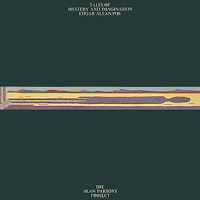
Tuesday, 24 January 2023
Ryo Fukui "Scenery" (1976)

Thursday, 7 October 2021
The Alan Parsons Project "Tales Of Mystery And Imagination" (1976)

Having sat with this debut album for some time now, Its easy to see why I Robot, Pyr△mid & Eve were recommended as Alan Parsons best work. Tales Of Mystery And Imagination would of been impressive for the times but experienced from its predecessors shadows, the classy songwriting pulling on a broad range of 70s styles sadly fumbles out of the gates. Its hallowed poetry recital intro leading onto dated robotic voices feels a little awkward in its infancy however flashes of genius are heard often too, The Raven, The Cask Of Amontillado and To One In Paradise, all are fantastic songs. In fact much of the record has the Alan Parsons sound intact but its fumbling moments seem to exacerbate the difference between it and the following.
Where the cracks appear is on its lengthy The Fall Of The House Usher. Its five parts represent many ideas that Alan would go on to compose again. Stitched together as one unified thing, it lumps along awkwardly from tense and brash Classical orchestrations of terror and tragedy, into psychedelic thunderstorms led by hypnotic synths. The music passes through a string of Pink Floyd akin guitar inflections back into distressing string sections promoting unease and brittle tensions. It then sways back into a Progressive styling with exotic instruments and colorful melodic arrangements, only to be dissipated back into a nightmare cacophony of claustrophobic strings and demonic drum strikes that ends all too abruptly.
The two sounds contrast each other and break up half the record with a sense of confusion. It does however skimmer with brilliance but in attempting to meld such bold ideas, the consequences are vast. Tthe musics spell feels so disrupted by this rude awakening of hellish Classical instrumentation. It had become a large focus that diminished the album experience and illuminated its other blemishes. That being said, at the core Alan's brilliant songwriting delivers similar ideas heard later. They however have a less vibrant production to bolster the beautiful compositions and thus the whole record just feels inferior. Had I started here, my opinion may be all too different.
Rating: 6/10



